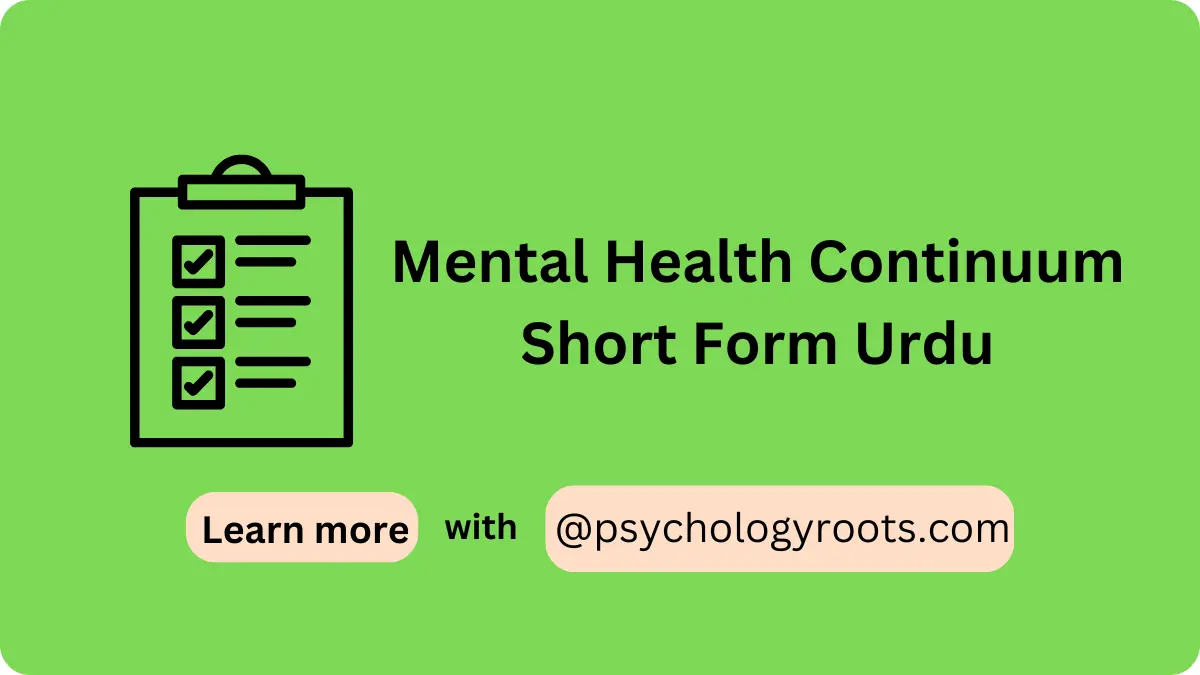Table of Contents
Mental Health Continuum Short Form Urdu
Here in this post, we are sharing the “Mental Health Continuum Short Form Urdu”. You can read psychometric and Author information. We have thousands of Scales and questionnaires in our collection (See Scales and Questionnaires). You can demand us any scale and questionnaires related to psychology through our community, and we will provide you with a short time. Keep visiting Psychology Roots.
About Mental Health Continuum Short Form Urdu
Scale Name
Mental Health Continuum Short Form Urdu
Author Details
Keyes, C. L., translated by Muhammad Faran and Farah Malik
Translation Availability

Background/Description
The Mental Health Continuum – Short Form (MHC-SF) Urdu Version is a culturally adapted tool designed to measure positive mental health in Urdu-speaking populations. Originally developed by Keyes et al. (2008), the MHC-SF assesses three main domains of well-being: emotional, psychological, and social well-being. This Urdu version was translated by Muhammad Faran and Farah Malik, PhD, from the University of the Punjab, Lahore, in 2015. The adaptation provides Pakistani clinicians and researchers a reliable tool for evaluating mental health within cultural contexts.
Administration, Scoring and Interpretation
- Explain to participants that this measure will assess various aspects of mental health.
- The questionnaire can be administered individually or in groups in either self-report or interview format in Urdu.
- The MHC-SF Urdu version consists of 14 items that measure emotional, psychological, and social well-being. Responses are rated on a 6-point Likert scale from 0 (Never) to 5 (Every day).
- Higher scores indicate greater positive mental health.
Reliability and Validity
- Reliability: The Urdu version demonstrates good internal consistency, comparable to the original English version.
- Validity: Cross-cultural validity studies confirm that the MHC-SF Urdu version effectively measures mental health across diverse Urdu-speaking populations, with robust psychometric properties similar to those of the original scale.
Available Versions
14-Items
Reference
Keyes, C. L., Wissing, M., Potgieter, J. P., Temane, M., Kruger, A., & Van Rooy, S. (2008). Evaluation of the mental health continuum–short form (MHC–SF) in setswana‐speaking South Africans. Clinical psychology & psychotherapy, 15(3), 181-192.
Lamers, S. M., Westerhof, G. J., Bohlmeijer, E. T., ten Klooster, P. M., & Keyes, C. L. (2011). Evaluating the psychometric properties of the mental health continuum‐short form (MHC‐SF). Journal of clinical psychology, 67(1), 99-110.
Yeo, Z. Z., & Suárez, L. (2022). Validation of the mental health continuum-short form: The bifactor model of emotional, social, and psychological well-being. PloS one, 17(5), e0268232. https://doi.org/10.1371/journal.pone.0268232
Important Link
Scale File:
Frequently Asked Questions
What does the MHC-SF Urdu version measure?
It measures emotional, psychological, and social well-being within Urdu-speaking populations.
Who can use the MHC-SF Urdu version?
Researchers, mental health professionals, and educators assessing positive mental health in Urdu-speaking contexts.
How is it scored?
Scores are summed across the 14 items, with higher scores reflecting higher levels of mental well-being.
Is it suitable for cross-cultural research?
Yes, it has been validated for use in diverse Urdu-speaking groups.
What age group is it suitable for?
The MHC-SF can be used with adults and adolescents, as it evaluates general mental health aspects.
Disclaimer
Please note that Psychology Roots does not have the right to grant permission for the use of any psychological scales or assessments listed on its website. To use any scale or assessment, you must obtain permission directly from the author or translator of the tool. Psychology Roots provides information about various tools and their administration procedures, but it is your responsibility to obtain proper permissions before using any scale or assessment. If you need further information about an author’s contact details, please submit a query to the Psychology Roots team.
Help Us Improve This Article
Have you discovered an inaccuracy? We put out great effort to give accurate and scientifically trustworthy information to our readers. Please notify us if you discover any typographical or grammatical errors.
Make a comment. We acknowledge and appreciate your efforts.
Share With Us
If you have any scale or any material related to psychology kindly share it with us at psychologyroots@gmail.com. We help others on behalf of you.